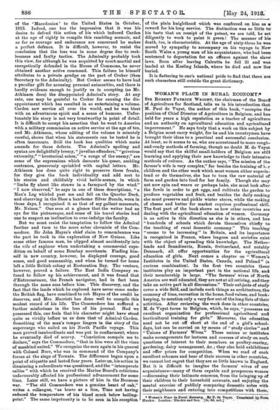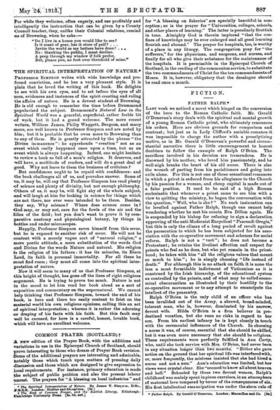WOMAN'S PLACE IN RURAL ECONOMY.* SIR ROBERT PATRICK WRIGHT, the
chairman of the Board of Agriculture for Scotland, tells us in his introduction that M. Paul de Vuyst, the author of this book, " occupies the- position of Chief Director of Agriculture in Belgium, and has held for years a high reputation as a teacher of agriculture and an authority on agricultural education and agricultural improvement." He says truly that a work on this subject by a Belgian must carry weight, for he and his countrymen have brought their ideas to a practical and successful conclusion. At least, so it seems to us, who are accustomed to more rough- and-ready methods of farming, though no doubt M. de Vuyst would say that the skilful small-holders of Belgium are still learning and applying their new knowledge to their intensive methods of culture. As the author says, " The mission of the- farmer's wife is very complex," for besides the training of kr children and the other work which most women either superin- tend or do themselves, she has to turn the raw material of farm and garden into food for her family. Though she may- not now spin and weave or perhaps bake, she must look after- the fowls in order to get eggs, and cultivate the garden to- produce vegetables and fruit, and besides the daily cooking- she must preserve and pickle winter stores, while the making of cheese and butter for market requires professional skill. The first part of the book shows us how other countries are dealing with the agricultural education of women. Germany is as active in this direction as she is in others, and has "hundreds of schools which devote themselves chiefly to the teaching of rural domestic economy." This teaching "seems to be increasing" in Britain, and its importance is recognized in France, where leagues and societies exist with the object of spreading this knowledge. The Nether- lands and Scandinavia, Russia, Switzerland, and notably Denmark, all offer opportunities for the agricultural education of girls. Next comes a chapter on " Women's Institutes in the United States, Canada, and Poland" curious combination). In the first two countries these institutes play an important part in the national life. and their membership is large. "The farmers' wives of North America are well educated, they are not at all retiring, and they take an active part in all discussions." Their subjects of study cover a wide field, and include such things as architecture, the economy of time, recreation in the home, food values, and book.: keeping, to mention only a very few out of the long lists of their activities. After reviewing the work done in other countries, M. de Vuyst turns to Belgium, which, be says, " possesses an excellent organization for professional agricultural and horticultural training for girls." Moreover, the education need not be cut off short at the end of a girl's school- days, but can be carried on by means of " study circles " and "Unions of Farmers' Wives." These unions or institutes make arrangements for lectures and courses of study on such questions of interest to their members as poultry-rearing, gardening, dairy management, &c. ; they also hold exhibitions' and offer prizes for competition. When we read of such excellent schemes and hear of their success in other countries, we cannot but regret that they are so little known in England. But it is difficult to imagine the farmers' wives of our acquaintance—many of them capable and prosperous women —discussing their intimate concerns, from the bringing up of their children to their household accounts, and enjoying the mental exercise of publicly comparing domestic notes with their neighbours and entering into competitions with them.
• Woman's Place in Rural Basnemy. By P. de Vuyst. Trauelated by Norm, Hunter. London ; 'Mackie and Son. [Si. tid. not] - -
kor while they welcoine, often eagerly, and use profitably and intelligently the instruction that can be given by a County Council teacher, they, unlike their Colonial relations, remind us of Browning, when he asks:—
"Do I live in a house you would like to see? Is it scant of gear, has it store of pelf ? . . . Invite the world as my betters have done? . No: thanking the public, I must decline. A peep through my window if folk prefer, But, please you, no foot over threshold of mine."











































 Previous page
Previous page